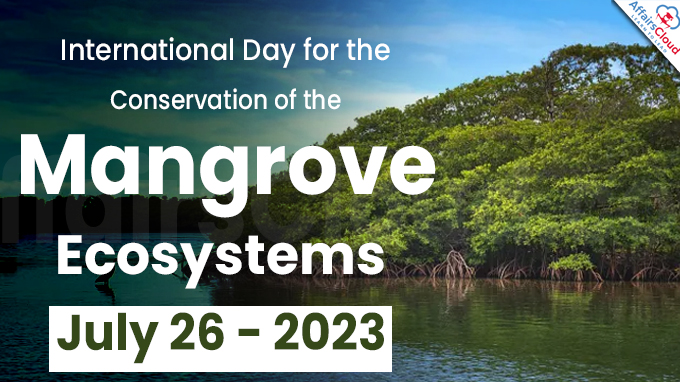 The United Nations Educational, Scientific and Cultural Organization (UNESCO)’s International Day for the Conservation of the Mangrove Ecosystems is annually celebrated across the globe on 26th July to raise awareness of the significance of mangrove ecosystems as “a unique, special and vulnerable ecosystem” and to promote solutions for their sustainable management, conservation and uses.
The United Nations Educational, Scientific and Cultural Organization (UNESCO)’s International Day for the Conservation of the Mangrove Ecosystems is annually celebrated across the globe on 26th July to raise awareness of the significance of mangrove ecosystems as “a unique, special and vulnerable ecosystem” and to promote solutions for their sustainable management, conservation and uses.
- The day is also known as “The World Mangrove Day“.
- 26th July 2023 marks the observance of the 8th International Day for the Conservation of the Mangrove Ecosystems.
Background:
i.On 6th November 2015, UNESCO at its 38th session of the General Conference adopted the resolution 38C/66 and officially declared 26th July of every year, in response to the request of Ecuador, as the International Day for the Conservation of the Mangrove Ecosystem.
ii.The first-ever International Day for the Conservation of the Mangrove Ecosystem was observed on 26th July 2016.
iii.The date 26th July also marks the death anniversary of Greenpeace activist Hayhow Daniel Nanoto, who passed away in 1998 during a massive protest to re-establish the mangrove wetlands in Muisne, Ecuador.
Significance:
i.Mangroves are rare, spectacular and prolific ecosystems on the boundary between land and sea in tropical regions, rooted in saline water and soils exposed to the tides.
ii.They ensure food security for local communities. They provide biomass, forest products and sustain fisheries and support rich biodiversity.
iii.It act as a form of natural coastal defence and help mitigate the effects of climate change and extreme weather events such as Tsunamis, storm surges, erosion and so on.
Global Mangrove Alliance (GMA):
The GMA is an extraordinary collaboration that brings together Non-Government Organizations (NGOs), governments, industry, local communities and funders towards a common goal of halting mangrove degradation and increasing mangrove cover by 20% by 2030.
Note: According to GMA, so far an estimated 67% of mangroves have been lost or degraded, and an additional 1% is lost annually. Overall, mangroves are disappearing 3 to 5 times faster than global forest losses with serious ecological and socio-economic impacts.
Mangroves and Sustainable Development Goals (SDGs):
All 17 Sustainable Development Goals (SDGs) are connected to Mangroves for the Future (MFF)’s Strategic focus areas: coastal rehabilitation; livelihood support; and resilience-building and empowerment, with climate change and gender as key cross-cutting issues.
Note: MFF, a partnership-based regional initiative co-chaired by IUCN (International Union for Conservation of Nature) and United Nations Development Programme (UNDP) to encourage investment in coastal ecosystem conservation for sustainable development.
Need for the conservation of Mangrove Ecosystem:
i.Although mangroves are found in 123 nations and territories, mangrove forests are globally rare. They represent less than 1% of all tropical forests worldwide, and less than 0.4% of the total global forest estate.
- 1 hectare of Mangrove can store 3,754 tons of carbon (it is the equivalent of taking 2650+ cars off the road for a year).
- UNESCO’s marine World Heritage sites host 9%of global mangrove carbon assets.
- A 500 meter mangrove strip reduce wave heights by 50 to 99%
- Carbon emissions from mangrove deforestation account for up to 10% of emissions from global deforestation (despite covering 0.7% of land).
ii.It has been estimated that more than 3 quarters of mangroves in the world are now threatened and with all the aquatic and terrestrial organisms that depend on them.
iii.UNESCO is engaged deeply in supporting the conservation of mangroves with the:
- inclusion of mangroves in Biosphere Reserves; World Heritage sites and UNESCO Global Geoparks; also engaged at the scientific and policy levels to protect, manage or restore global blue carbon ecosystems (mangroves, seagrasses and tidal/salt marshes) for addressing climate change.
About United Nations Educational, Scientific and Cultural Organization (UNESCO):
Director-General– Ms Audrey Azoulay
Headquarters– Paris, France
Founded in– 16 November 1945




